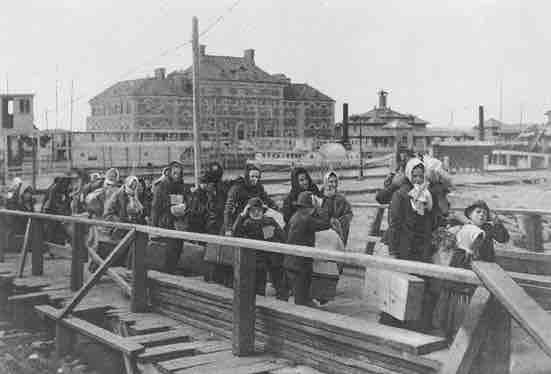The outbreak of war in 1914 increased concern over the millions of immigrants to the United States, many of whom could not return to their native countries in Europe. The great majority decided to stay in America and use their savings to buy homes and help additional family members immigrate. Foreign language use declined dramatically, with many immigrants signing up for English-language classes.
Still, the question of whether they were politically American or still harbored loyalties to their native countries brought about a widespread push for "Americanization" of immigrants, which included efforts by the government and private organizations to ensure they embraced full, long-term assimilation into American society.

Immigrants Arriving at Ellis Island
Immigrants became a concern for the U.S. during the war and led to Americanization campaigns throughout the country.
Agencies and Americanization
Numerous agencies became active in promoting Americanization so the various ethnic groups among immigrants would be psychologically and politically loyal to the United States. Individual states set up programs through Councils of National Defense, while the effort was also taken up on the federal level by agencies such as the Department of the Interior, the Food Administration, and the Bureau of Education. The privately operated Committee for Immigrants in America helped fund the Division of Immigrant Education within the Bureau of Education.
The most significant private organization in this effort was the National Americanization Committee (NAC), which operated under the direction of Frances Kellor, who in 1909 served as secretary and treasurer of the New York State Immigration Commission before becoming chief investigator for New York State’s Bureau of Industries and Immigration from 1910 to 1913. She also worked as managing director of the North American Civil League for Immigrants and was involved in the American Association of Foreign Language Newspapers, which linked American advertisers and foreign-language newspapers for immigrants, and the Progressive National Committee, a political organizing group for Theodore Roosevelt’s Progressive Party.

Frances Kellor
Frances Kellor, ca. 1910. The National Americanization Committee, led by Kellor, was one of the most significant private organizations working toward Americanization.
In 1916 Kellor proposed combining efficiency and patriotism in the NAC’s programs. It would be more efficient, she argued, if factory workers all understood direction given in English in order to avoid accidents. Once Americanized, workers would embrace American influences such as industrial ideals and be less likely to follow strike agitators or foreign propagandists. The result would be a transformation from indifferent and ignorant residents into thoughtful voters who would make their dwellings into American homes and spread American standards of living throughout their ethnic communities. Ultimately, Kellor said, Americanization would "unite foreign-born and native alike in enthusiastic loyalty to our national ideals of liberty and justice."